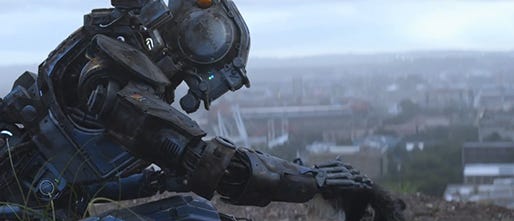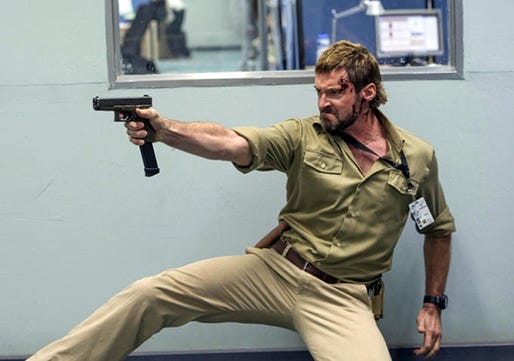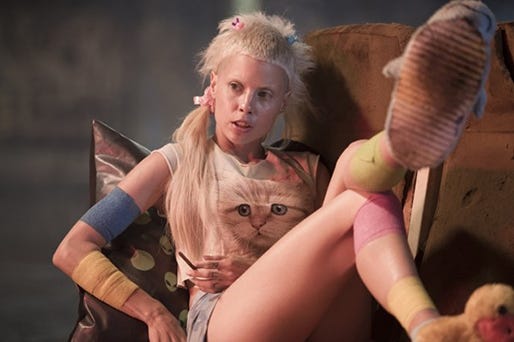Chappie

Bland, aimless badness has its virtues; you can watch, process, assess and move on from such movies with as little mental muss or fuss as their filmmakers put forth. That bad is easy, and it’s far preferable to the painful coulda-woulda-shoulda bad of “Chappie,” writer-director Neill Blomkamp’s latest average-denting trip to the plate.
Woefully indecisive, tonally whiplashed, wildly inconsistent and utterly incapable of corralling occasionally brilliant bits into anything a coherent vision? That’s the brand of bad here, and boy, does “Chappie” wound you — especially considering Blomkamp’s confidence, control and conviction that elevated him to the big time.
With “District 9,” Blomkamp authoritatively roared with one of the last decade’s most audacious, auspicious debuts. It wasn’t so much the originality of his narrative as it was the allegorical alchemy he performed on the looks, moods and feels of past masters. His independently funded story of alien occupation and oppression was a knockabout mix of xenophobia satire, apartheid commentary and raucous action reminiscent of Paul Verhoeven’s finest. You expected apartheid angles of a South African movie; you didn’t anticipate a ballsy undercurrent of disenfranchised blacks taking delight in torturing aliens — the new low men on a sociological totem pole.
A bigger studio budget from Sony and more global ambitions (a socioeconomic healthcare parable) drove Blomkamp’s 2013 follow-up, “Elysium.” This handsomely mounted chase movie clearly laid its tracks as the train barreled down behind it — occasionally exciting, but an ultimately lethargic, soulless effort … and one for which Blomkamp has apologized in interviews for “Chappie” (also a Sony film).
Blomkamp certainly presents scenes you’ve never seen before in “Chappie.” The problem is that it hardly seems worth seeing a sentient, childlike robot talk jive, jack cars and rob banks alongside criminals dressed like “The Road Warrior” by way of Urban Outfitters. It’s one of many tone-deaf distractions “Chappie” attempts before its risible rabbit-hat-trick ending.
In a crime-ravaged Johannesburg, robotics company Tetra Vaal has supplemented human cops by selling the police a fleet of ’bot cops known as Scouts. As front-line responses to dangerous situations, Scouts have suppressed crime — much to the consternation of low-level hoods Ninja and Yolandi, and their boss, Hippo, whom they have only several days to reimburse for a large sum they’ve lost. (Hippo’s Afrikaans-accented dialogue, which is almost always intelligible, is oddly subtitled, but we’re left hanging on Ninja’s marble-mouthed screeds.)
Scout #22 is an oft-abused unit, taking more bullets than the average. But he’s designated for scrap when an RPG attack irreparably fuses his battery and his chassis. He’s also a perfect canvas for Scout creator Deon Wilson (Dev Patel), whose AI aspirations go beyond drone deterrents. Deon wants to create a robot that can write poetry, compose music, examine art for itself and decide how it feels. His boss (Sigourney Weaver, in a pro-forma blah cameo) has no interest beyond point and shoot. Inspired by a cat poster (no joke), Deon steals #22 to test a consciousness program he’s written. (The frequency with which Deon sneaks in and out of Tetra Vaal unchallenged, even as he later becomes their target, is preposterously stupid.)
But before Deon can begin, Ninja and Yolandi accost him; they intend to steal #22, reprogram it to pull off dangerous heists and pay off Hippo. Deon complies, but only if they let him consult, and thus #22 becomes Chappie. Exceptional visual effects render #22’s purposefully inexpressive police-force face into something both persuasive and poignant. A moment when Chappie, like an animal terrified by its very awareness of being alive, skitters in uncertainty is wondrous to behold.
Yolandi christens him Chappie and becomes his “mommy.” His “daddy,” Ninja, tries to toughen Chappie up and his “maker,” Deon, strives to inspire a true-north moral compass. “Don’t let this barbarian ruin your creativity, Chappie! Nurture your creativity!,” Deon bellows, which, in the context of Blomkamp’s as-yet-unsuccessful studio work, feels like a self-referential affirmation to keep on trucking.
That’s already more story than the movie can handle, but wait! There’s Deon’s Tetra Vaal rival, Vincent Moore. Played by Hugh Jackman, Vincent’s sketch-comedy mullet and tight gamekeeper shorts are unintentionally hilarious gifts that keep on giving. Vincent is pissed that the police prefer Scouts to his human-controlled, heavily militarized Moose model — a blatant rip-off of “RoboCop’s” ED-209, only this one can fly. (Strangely, “Chappie” never bothers to question why police are comfortable with a lack of human control, or why Moore couldn’t simply scale his model down to something Scout-sized.)

Jackman lends interesting idiosyncrasies to this intimidator; he wears a sidearm in an office setting, and it’s a special breed of control freak that keeps toiletries in an office bathroom with a “Don’t touch” warning sign. But Vincent later becomes a standard-issue sadistic saboteur, viciously attacking Chappie and all of his friends.
There’s a flicker of promise when Chappie learns his battery can’t be recharged and he has only five days to live. Will Blomkamp commingle thorny notions of religion and robotics through Chappie coming to terms with a creator who would allow such swift death? That’s the sort of brave, crazy discourse with which “District 9” was marbled, but there’s simply too much fat to “Chappie.” It quickly casts aside such queries for interminably long montages with Ninja and Yolandi.
These weak-tea attempts at crime comedy are the absolute dumbest thing about “Chappie.” Ninja and Yolandi Vi$$er are better known as Die Antwoord, a South African rap duo of whom Blomkamp is apparently far too enamored. Ninja is a knobby beanpole whose bones seem ready to pierce the skin covering them. Yolandi resembles a bleached-blonde human-badger hybrid and speaks like a sprite forever on the verge of a sneezing fit. They play fictionalized versions of their image-conscious personae.

Not for nothing are those dollar signs ostentatiously wedged in their names. After a while, Ninja and Yolandi’s abandoned-warehouse hideout feels like a tenement-chic pop-up shop packed with Die Antwoord T-shirts, slogans and logos. At one point, Yolandi inexplicably dons a T-shirt bearing a professionally designed Chappie logo; not bad for a robot they’ve only known for a few days by then. Blomkamp has made plenty of fine commercials; “Chappie” isn’t one of them, and it’s embarrassing to see him shilling someone else’s vision at the expense of his own.
Yet that presumes Blomkamp has one for almost anything else in the movie. He seems bored by the perfunctorily loud, frenetic dystopian action scenes, into which Hans Zimmer’s atypically obnoxious score tries to body-slam a sense of urgency. He abandons Vincent’s perils-of-AI polemic. And a laughably bonkers coda torpedoes his meaningful considerations about consciousness. (Par for Sony’s garish product-placement course, “Chappie” suggests a tower of PS4s, a VAIO laptop and an Internet connection are all you need to unlock the secrets of where the soul resides.)
What is clear about “Chappie” is the excellence of a motion-capture and voice performance by Blomkamp’s muse, Sharlto Copley. His virtual turn here nearly matches the greatness of his actual presence in “District 9.”
The way Chappie’s physical points of reference come to mimic those around him is astonishing; a disaffected and derisive tough-guy sniffle becomes a particularly amusing, and credible, accessory gesture. Then there’s the way his voice takes on the alternate affectations of academia (Deon), affection (Yolandi) and aggression (Ninja) that he hears. In other words, Chappie is a child — one whose mind races with questions and whose heart swells when authority figures praise him. Nearly all of Copley’s utterances end in a question mark (“Chappie do good for Daddy?”), and although Chappie’s chatterbox conversations will prove divisive, Copley lends them an emotionally comprehensive complexity in a film that could use much, much, much more of that. It’s so good that when Vincent and his goons aggressively hold Chappie down, his screams (“Chappie has fears!”) are unbearable, and it’s hard not to recognize parallels to Eric Garner’s panicked real-world “I can’t breathe!”
Aside from such fleeting moments, “Chappie” rarely rises to the thoughtfulness of Chappie. And while Blomkamp remains an exceptional world-builder, what good is that if the culture of that world isn’t interesting whatsoever?
If this seems too hard on Blomkamp, it’s only because that he tries too hard to make “Chappie” all things to all people. There’s an inherently intellectual, and child-friendly, PG-13- or even PG-rated curiosity to this story that gives way to cruelly violent R-rated mood swings — like when Chappie’s best friend is viciously ripped in half. “Chappie” need not recycle the gore for which Blomkamp is known, but he figures it’s expected of him and uncomfortably shoehorns it into the story.
Before “Chappie” opened, Blomkamp announced his next project as a new installment of the “Alien” franchise with which he’s been tooling for some time. On one hand, it’s worrisome that a flag bearer for original science-fiction tales could wind up confined by the carefully measured dimensions of a franchise. On the other, “Chappie” finds Blomkamp yet again stifled by his own sandbox, and maybe the change of scenery will do him good. Blomkamp is nowhere near the poor-me swamp that swallowed M. Night Shyamalan or the visual-effects vortex to which we’ve seemingly lost Peter Jackson. But the next steps he takes are going to be crucial.
Ultimately, “Chappie” is about someone whom you know to have better instincts than their behavior suggests, and you hope those instincts win out in the end. After this, you’ll feel the same about Blomkamp. It’s the kind of bad from which somebody can bounce back … but damn, does it hurt to watch.
